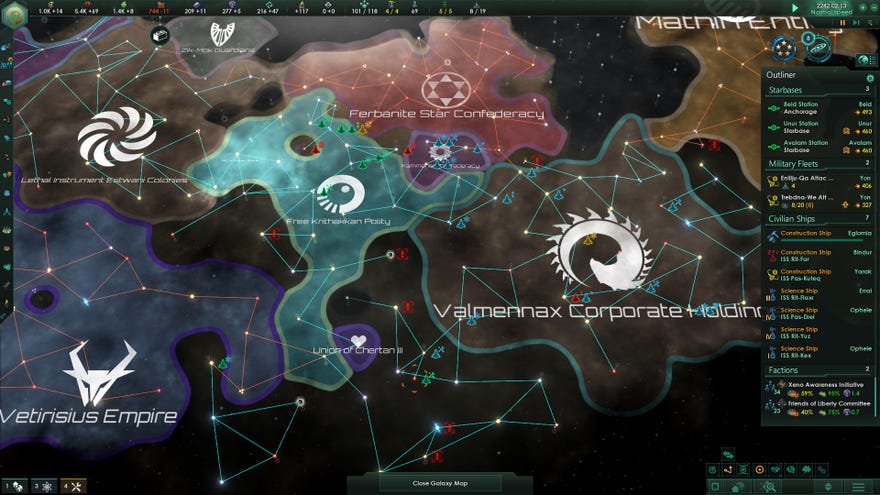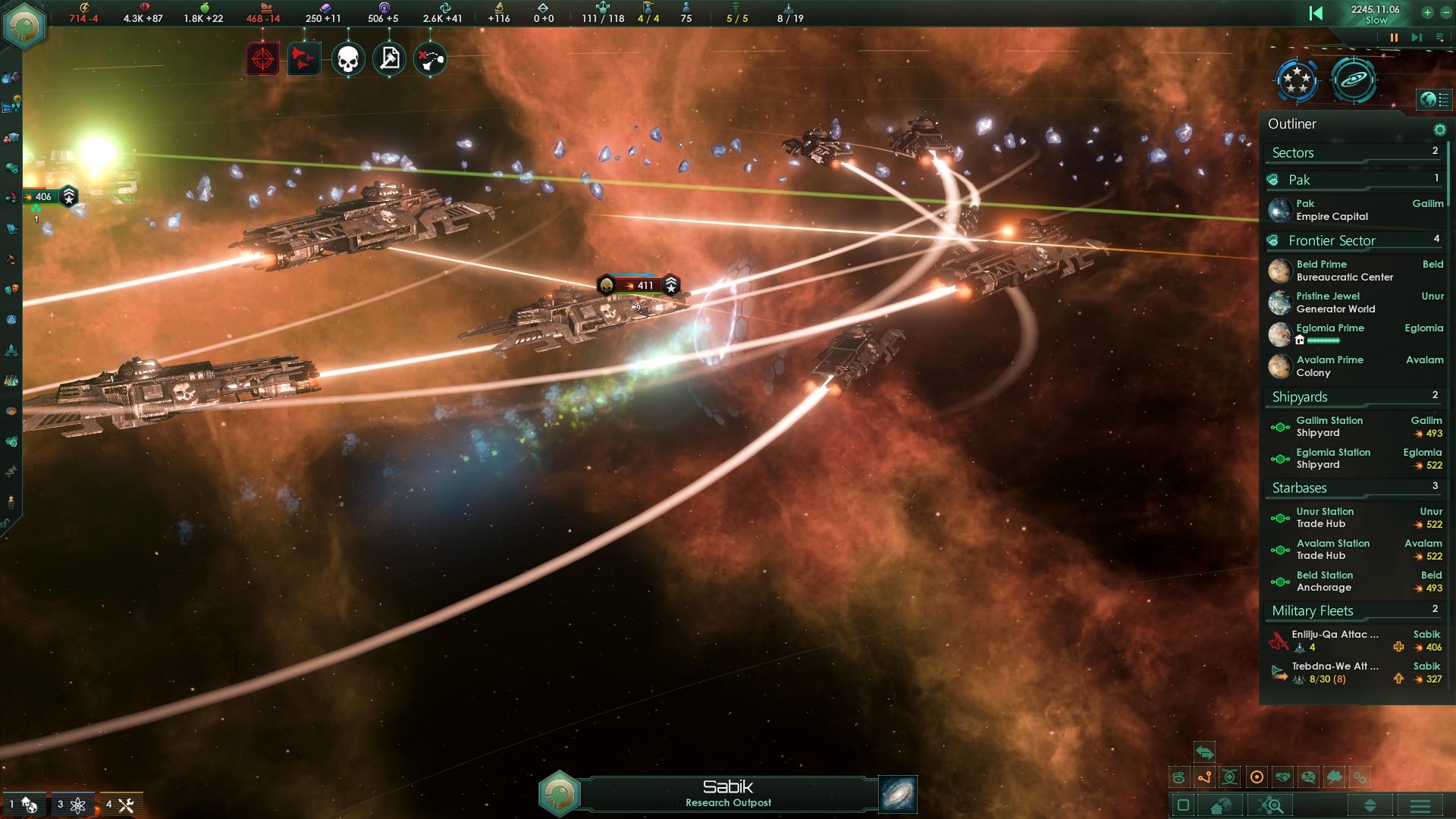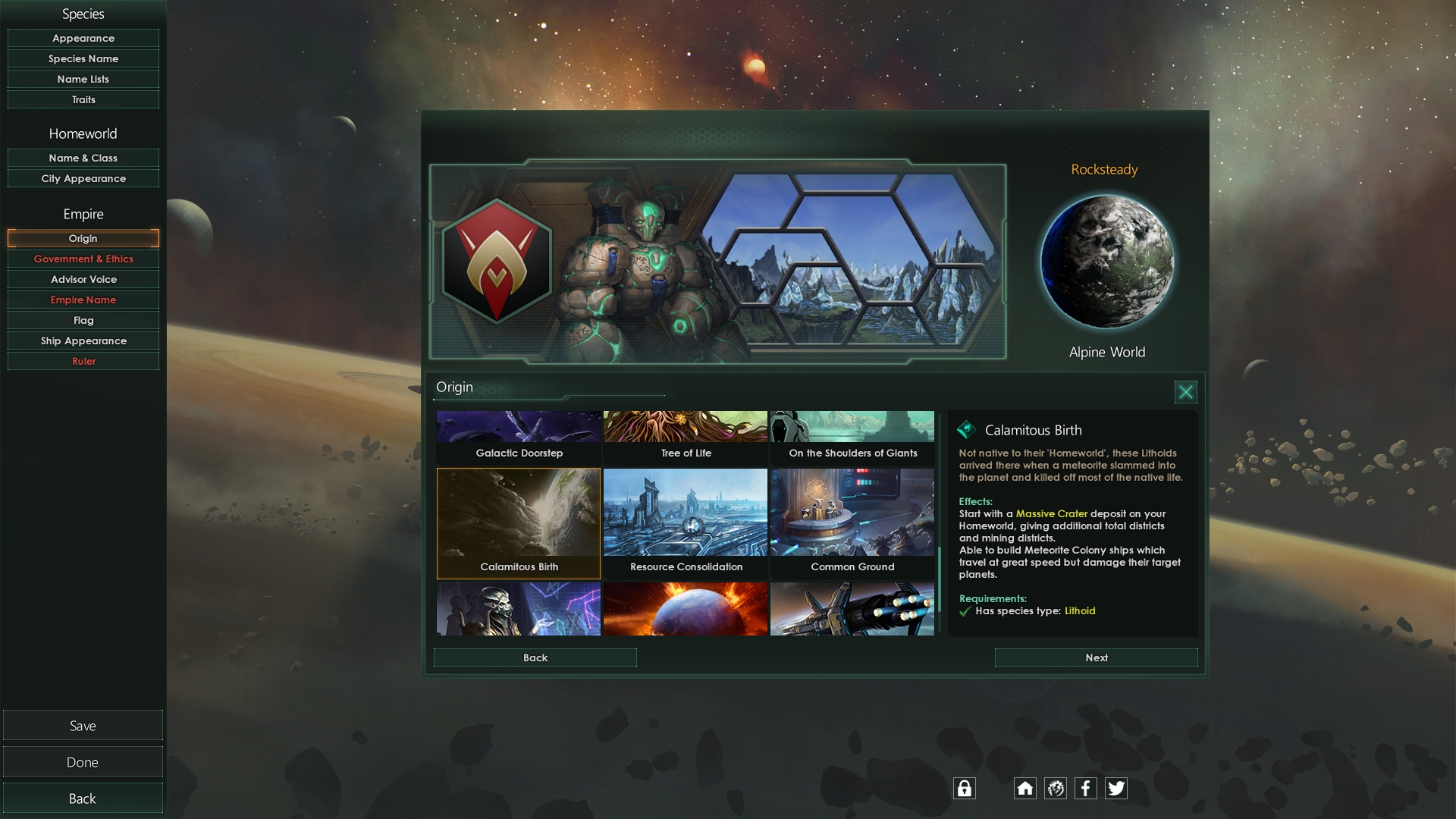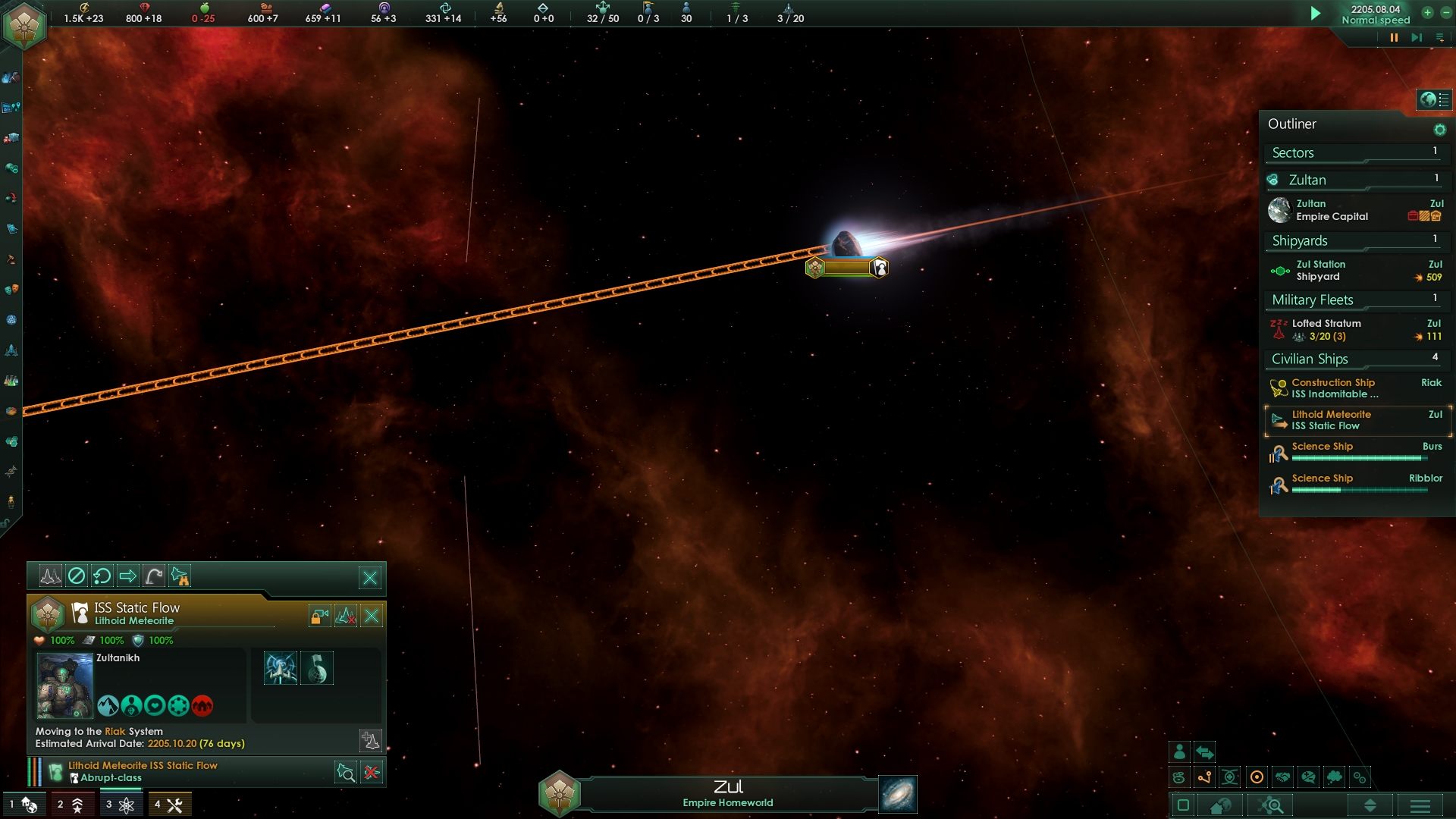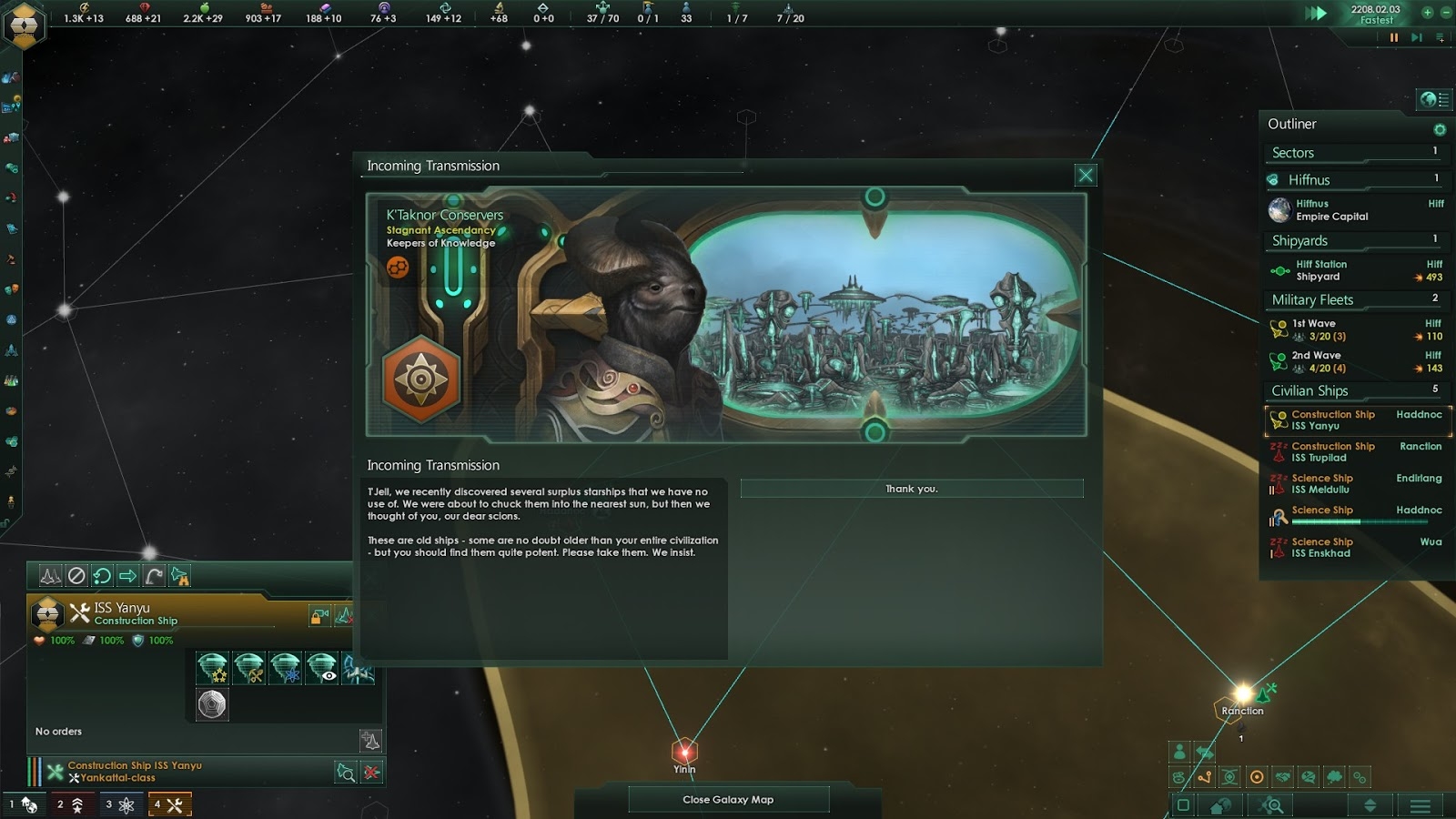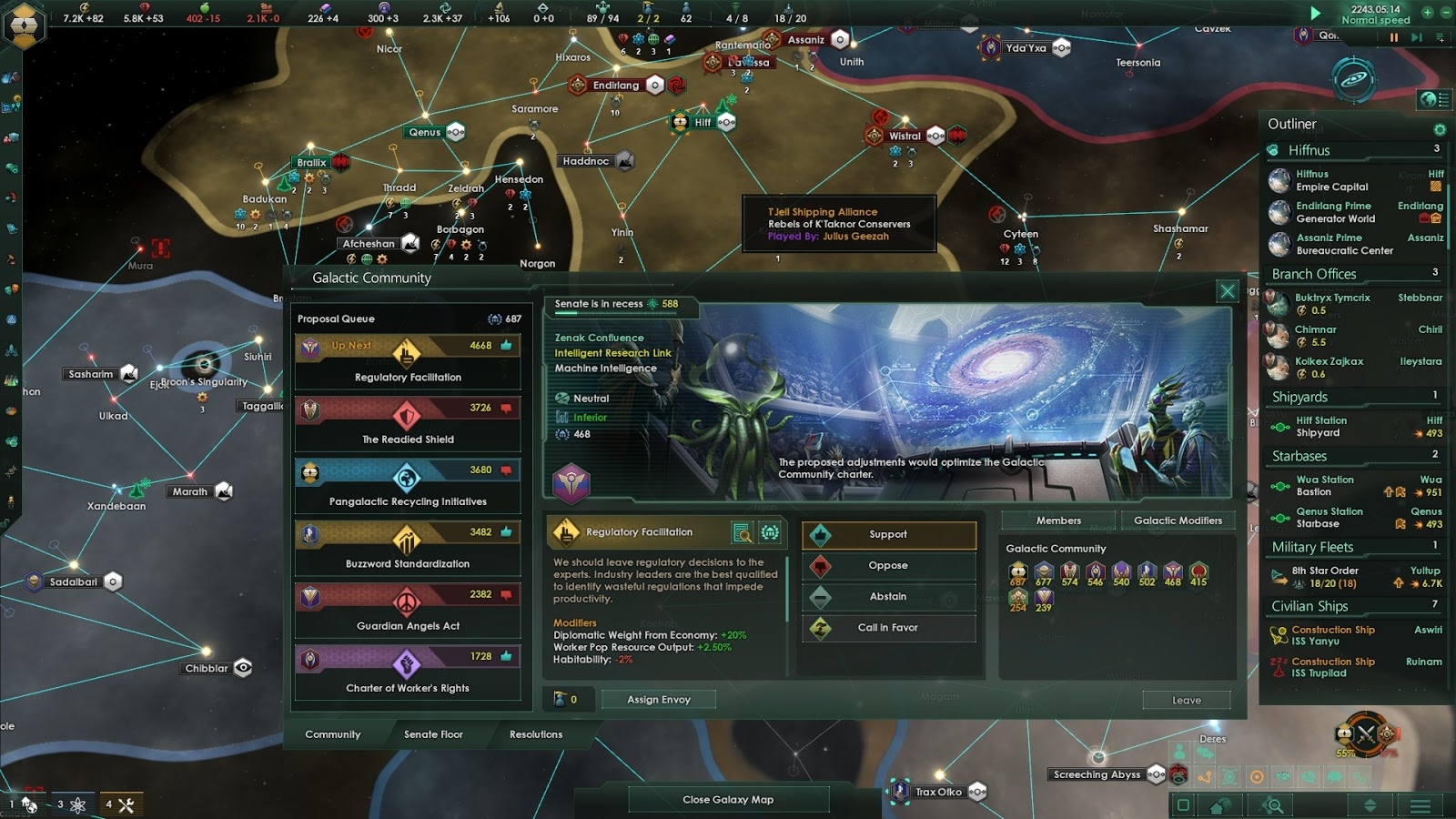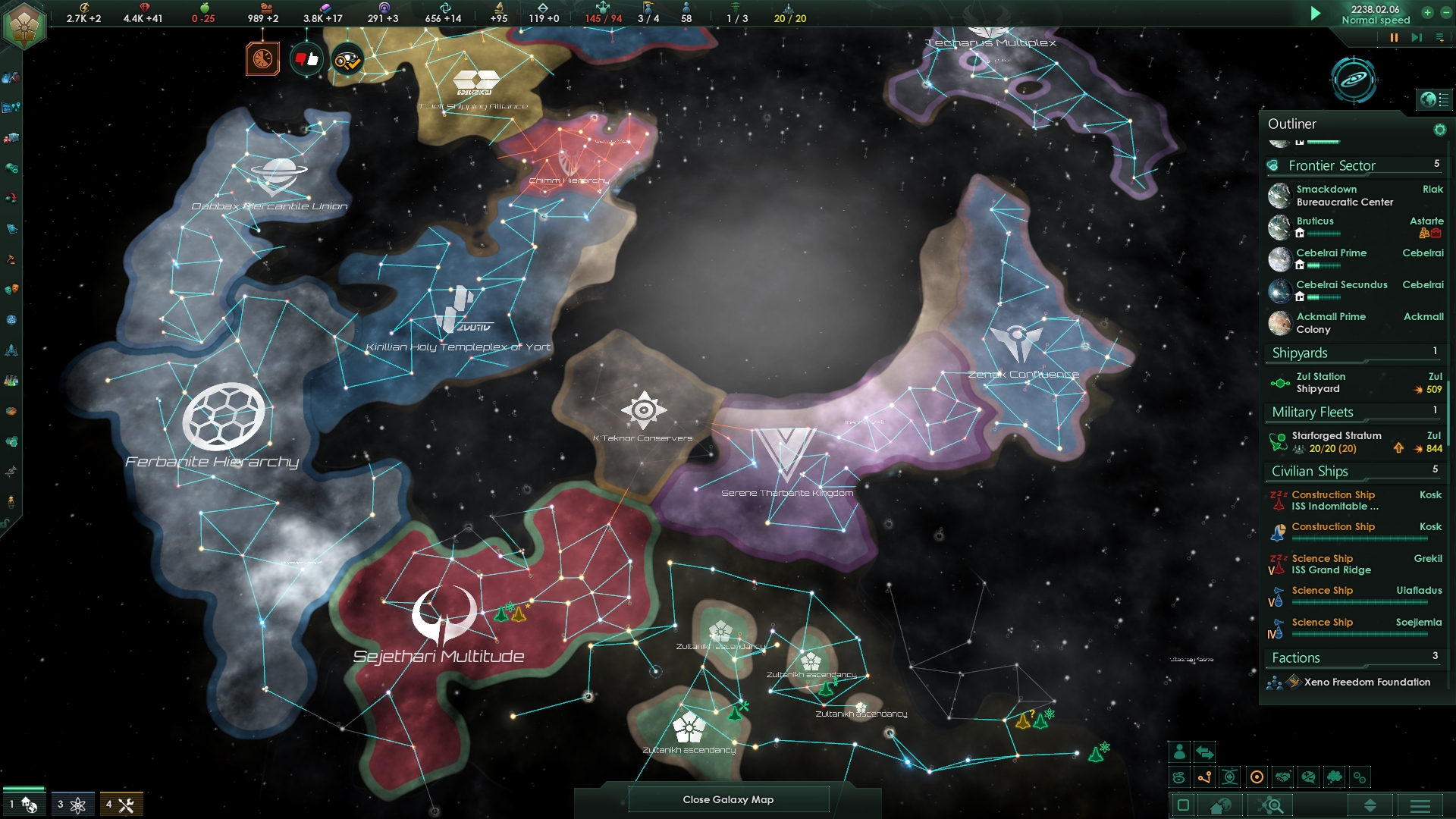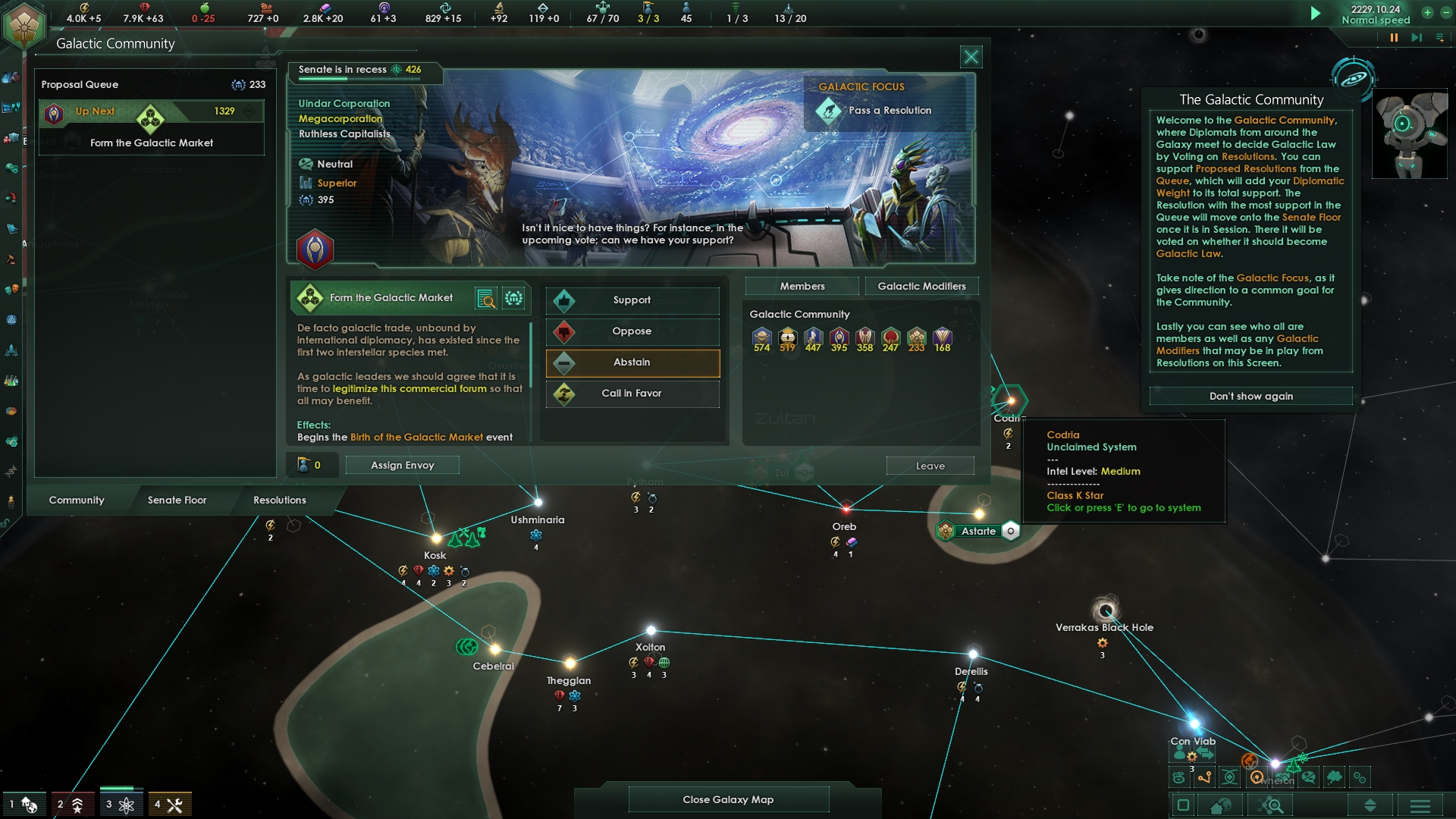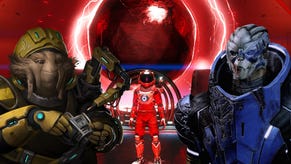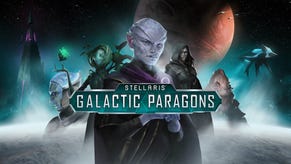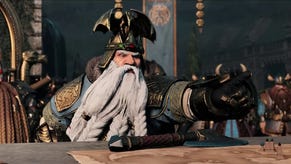The RPS Verdict - Stellaris: Federations
Nic & Nate make classic space mistakes
Nate: The galaxy has been remade once again. Space opera strategy extravaganza Stellaris has a new DLC out, called Federations, and a massive free patch that overhauls a greater-than-usual number of the game's systems. Both the DLC and the patch focus hard on diplomacy, and so I thought it'd be a good idea to rope in a fellow space obsessive and see if, working together, we could befriend our way to dominion over the galaxy. (At this point, I'd like you to imagine regular contributor Nic Reuben smashing through the wall on a knackered space motorbike, before taking an open-necked chug on a can of space off-brand energy drink and throwing the can into a neutron star).
Nic: It's all quite a lot to take in really, isn't it? There's just so much in Stellaris, that when you play after a big update, it's hard to pick out what's new, and what's something you just haven't encountered before.
Nate: Right - and even the stuff you're familiar with takes on a whole new set of implications when it's combined with new mechanics or systems. It's a whole new game, every time a major bit of DLC comes out, so you can't really evaluate the DLC in isolation. It’d be like trying to review a slice of gherkin on a burger - entirely possible, but best just to talk about the burger as a whole.
Nic: Ah, funny you should mention burgers, actually. Reminds me of a tale I once heard involving burgers. Space burgers, as it goes.
Nate: Is it the tale of the species you’ve created for this test game, by any-
Nic: I used the new Scion origin to create a megacorp called The T’Jell Shipping Alliance, a culture of shrews with protruding star-noses, whose favourite fast food chain eventually grew so wealthy and influential it subsumed their government. The T’Jell lived in relative prosperity for a time, until they encountered a roving war fleet from an ancient and powerful fallen empire, who vassalised them in exchange for a constant supply of fluffy grease nuggets and apple pies hotter than the fire of a thousand suns.
Nate: I absolutely love the new origin stories you choose for your spacefolk - they're just as cool as I hoped they would be back in October, and they're a great example of how Stellaris makes its reams of Sci Fi lore have interesting, pronounced consequences in game. I've used the new Lithoid species pack to make a load of fanatically xenophilic, conservationist rock golems called the Zultanikh, who would be everyone’s best mates if it wasn’t for their fatal flaw: they colonise other planets by smashing meteorites into them, wrecking continents in the process. It’s awkward.
Nic: This is going to be great, I can feel it.
[Nic and Nate play a five hour game of Stellaris.]
Nate: Well, that was a disaster. But I had a grand old time.
Nic: Definitely. All the parts where we weren’t getting eviscerated by my former liege lords, the K'Taknor, in a doomed war for independence, were great. That was great too, just for different reasons.
Nate: Yeah, our actual federation didn't last long, did it? Because to form it, you had to be independent and, well, turns out resistance really was futile. In hindsight, do you think you did wrong by your celestial masters?
Nic: Sort of. I mean, they had it coming, at least. The K’Taknor, on first contact with the T’Jell, wiped out most of us in some Malthusian quest for ecological conservation. But then the K'taknor discovered our delicious and affordable value meals, and enjoyed them so much they vassalised us. And to be fair, they were good to us in-game - eight years in, they gave us a whopping 6,000pts worth of warships which, they said, they were just going to throw into the sun otherwise. After putting basically no effort into fleet building, I was an early-game military superpower.
Nate: I was really jealous of that. My poor rock lords just smashed into a load of empty planets on the other side of the galaxy, quietly expanding. Lithoids eat minerals instead of food, and are hardy fellows, so I was colonising a much wider range of planets than I usually would. But the Zultanikh were feeling increasingly lonely, because we couldn't find anyone else to offer hypervelocity orbital hugs to. Until we found those adorable hiveminded snails, that was. And luckily, they were amenable to trade, so we gave them a vast quantity of rocks in exchange for being allowed to look through their phonebook.
Nic: And then suddenly, there were some talking rocks on the blower.

Nate: The Zultanikh were itching to form a federation, as they had oodles of planets, but grew too slowly to fill them up - the hope was, we could convince loads of lovely aliens to come and live there, so we could put the brakes on the planet-smashing-into for a bit. Unfortunately, like a dishonest husband on a dating app, the Burger Mice from Mars neglected to mention that they were prohibited from entering a federation by their space-dads, the K'taknor. But it was OK, because we could work on that in the long-term.
And that's a good point to mention one of the things I really like about post-Federations Stellaris: you spend a hell of a lot less time sticking the game on fast speed to wait for things to happen. There's a raft of new and pleasant distractions, and one of the biggies (which is included in the free patch, by the way) is the Galactic Community. It's the UN but for space squids, basically, and lets you vote for or against resolutions that might benefit or impede your play style, with all the juicy favour-calling-in and dastardly bloc voting you'd hope for from such a thing.
Nic: The first motion The T’Jell brought up in the senate was a recycling initiative, which we realised - just moments after everyone started giving it the thumbs-up - completely contradicted our interests. It would make our economy weaker, and force us to do something with all those plastic straws we’d previously just been using to poke the eyes out of rare fish for funsies.
Nate: It made the Zultanikh like their new friends even more, however, as it showed they were (apparently, at least) committed to the same conservationist values as we were, when we weren't obliterating entire hemispheres in order to set up a small town. That's another thing that really shines about the new diplomacy mechanics when playing multiplayer. While you're ultimately in charge of what you choose to trade with other humans playing, your empire's opinion of them, and stance towards them, is still emergent from game systems. It forces a certain degree of roleplay, rather than just letting you mutually powergame trades and treaties while building up cultures that would hate each others' flourescent guts in real (space) life.
Nic: I figured the T'jell's rookie mistake made sense, in fact. All that democracy would have felt intoxicating to these long-time vassals, who could no longer remember a way of life beyond the reach of the K'taknor's velvet-gloved fist. Of course they were going to propose the first initiative they saw. Unfortunately, it wasn't long before they wanted another sip at their extra large fizzy drink of freedom. As the mid-game set in, the chains of bondage were starting to chafe on the T’Jell’s ankles big time.
Envoys - like the ones in Paradox's Europa Universalis games - had been sent across the galaxy to build up our rep, and we'd secured commercial pacts with a few other empires. Our economy was looking pretty solid. We’d even been present in galactic politics, being instrumental in voting down a bunch of armoured squidmen when they argued that owning warships should give them more diplomatic weight. The T'jell had always called ourselves a family business. Now, we realised that our real family... was the entire universe!
Nate: I mean, the voting against the squidmen thing was technically against your own interests, yet again.
Nic: Hey, just because we had a big fleet, didn't mean we had no morals! We wanted to move the galaxy away from militarisation... and towards excessive burger consumption.
Nate: Well, either way, the Zultanikh weren't complaining. We'd been busy trying to get our homeworld recognised as the central hub for galactic trade - a sort of Giga Wall Street, if you like - as part of the new trade features brought in by the addition of the Galactic Community. We were beaten to it by a different group, but it soon wouldn't matter, as our world was about to be flipped-turned-upside-down, like a burger on a griddle. The T'jell messaged us, promising the adventure of a lifetime.
Dear rock lads. We're casting off our chains so we can finally make that federation. Whaddya say? Bring loads of your smashing rocks.
Nate: Needless to say, we accepted with gusto. Allying with our friends, we prepared to support them in liberating themselves. They declared a war of independence, and... two years later, every single one of our colonies had been reduced to a sea of nutritious glass. Because the T'jell had been vassals to a fallen empire of godlike power. I suppose we ended up consigned to the same servitude as them.
Nic: Lifting the chips out of the fryers with your big stony hands.
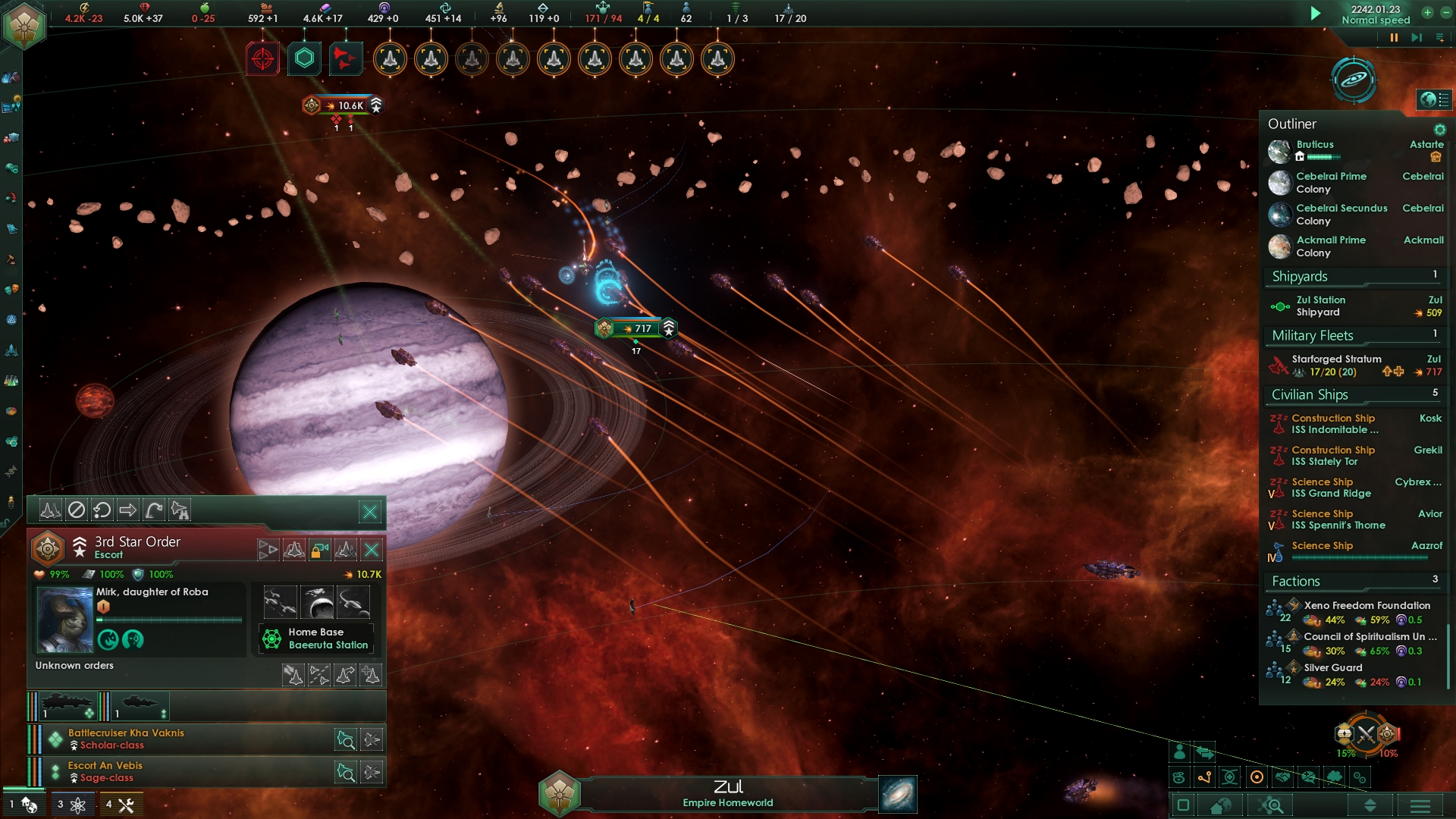
Nate: Especially as someone who likes peaceful, narrative-driven play, I'm much more enamoured with this latest version of Stellaris. I'd spent years trying to make a proper federation happen in previous iterations, but always found that some combination of AI-culture RNG and inflexible diplomacy made it practically impossible. This time, it would have been easy as pie were it not for Nic's (admittedly awesome) origin pick. Luckily, I'd enjoyed myself so much I went on to play most of the way through a session in single player, using an origin pick that - so, so satisfyingly - started me off as the leader of a tiny, three-species federation.
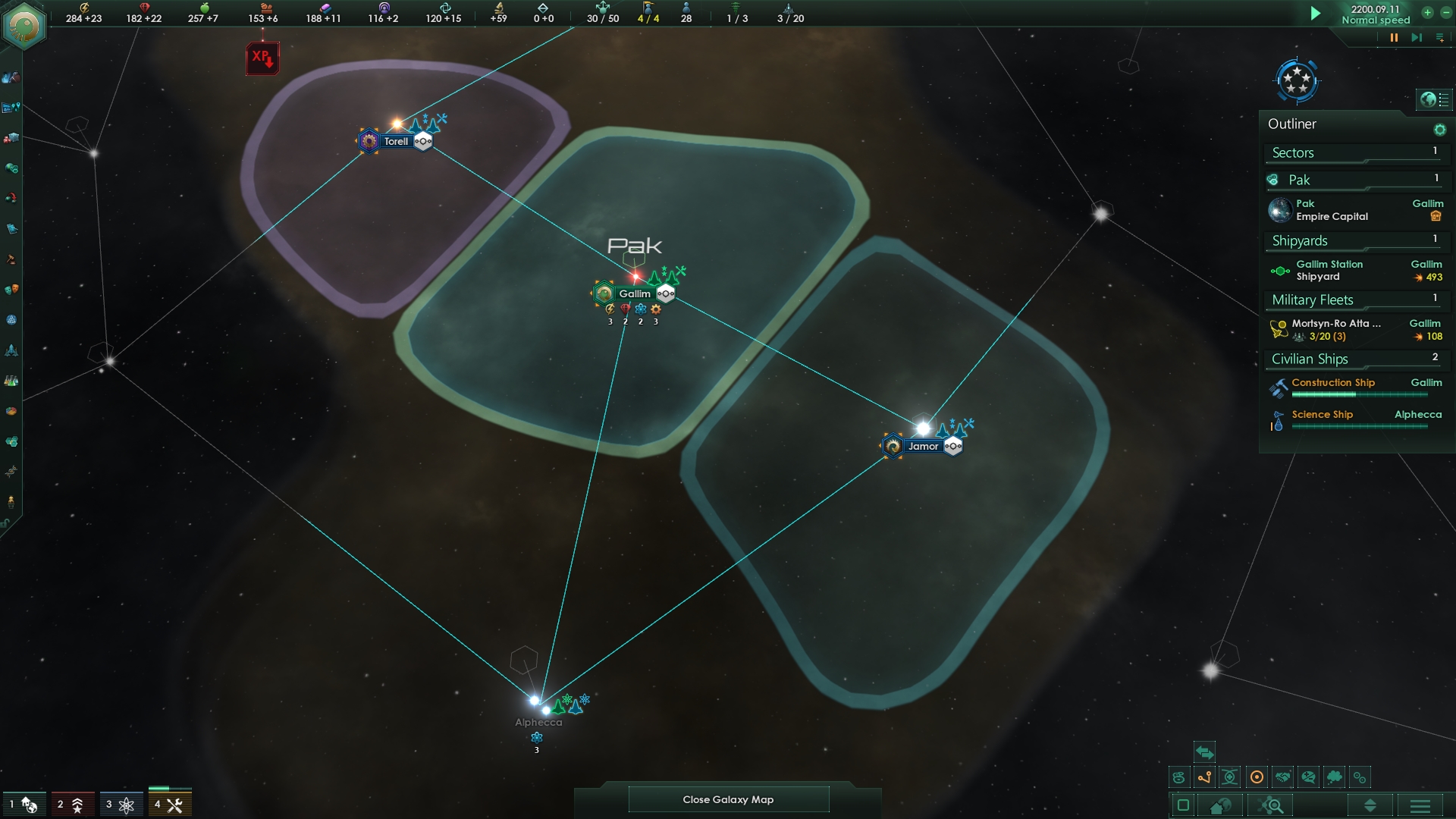
I felt like the actual business of running a federation was still a little bare-bones - beyond increasing its cohesion with envoys, and using that cohesion to customise stuff like migration policy and federation fleet contribution rules, there wasn't a vast amount to be done with it. But combined with the new Galactic Community, and especially in light of the fact that diplomacy has always been one of Stellaris' big weaknesses, it was a dramatic and welcome improvement.Performance has definitely been improved since the last time I got really into the game, and although I only dabbled in the ways of the laser gun, the consensus seems to be that military action is becoming both more intuitive and more tactically varied. Stellaris was never a bad game at all - it just never quite lived up to its dizzying potential.
Nic: I also ran a concurrent solo game, with a species of boring but friendly humans with the new ‘Common Ground’ origin pick - the same one Nate picked. By the year 2242, my Federation had reached level 3, which granted some nicely thematic, if slightly underwhelming, perks. My ships moved 10% faster in federation space, for example.
The Galactic Community had also been established, and just like in our multiplayer game, the warmongers wanted more diplomatic weight for ships, the more populous species wanted bonuses for pops, and so on. This basically encapsulated both my favourite thing about this DLC, and my biggest unfulfilled wish. Because while it absolutely amps up the amount of decisions you’ll be making on any given space year, and adds even more opportunities for roleplaying, there’s also, inevitably, a sense of cutthroat motivation underscoring it all. This is the nature of the genre, I know! It makes perfect sense the AI would want to make themselves as dominant as possible. But what I’ve always wanted from Stellaris was more ways, simply put, to be nice.
Poking around the senate right now, I’m seeing some really dramatic motions you can pass for galaxy wide demilitarisation, extradimensional research initiatives, and a lot of things that support non-domination playstyles. So I do think the DLC has more story-focused players like me and Nate in mind. I think it’s a huge leap in the direction I’d like to see Stellaris continue going.
